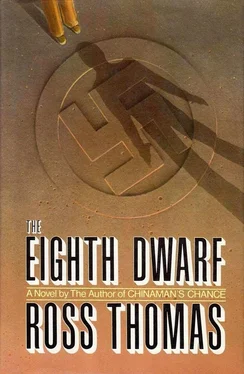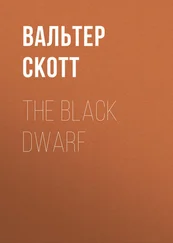Swanton shook his head again. “So that’s how it stands. We’re denazifying them, whatever that means, and the Russians have got ’em out fixing the gas works. As for how we’re gonna make small-d democrats out of ’em, I don’t know.”
“You like them, don’t you?” Jackson said.
“Who?”
“The Germans.”
Swanton thought about it. “I like people. They interest me. I have a hard time blaming Hitler on a six-year-old kid with malnutrition and no place to sleep. No matter how you slice it, it’s really not his fault. But he’s going to be paying for it all his life. So that’s why I had to go back to New York. They had to cut ’em out.”
“What?”
“My ulcers,” Swanton said,
Otto Bodden, the printer, stood in the cold rain across from the ruined Hauptbahnhof in Frankfurt and waited for the woman. Out in the middle of the intersection a tall policeman in a long, warm blue coat directed traffic. The policeman had a cheerful smile on his face despite the rain, and Bodden decided that the smile was there because the policeman was fed and warm and had a job that let him order other Germans around.
It was Bodden’s second day in Frankfurt since his arrival from Hamburg, where he was almost sure that he had lost the yellow-haired man. Last night he had slept in the cellar of a bombed-out Gasthaus whose owner, after a fashion, still followed his innkeeping trade by renting out the cellar’s corners to the homeless. The innkeeper had wanted to be paid in food, but since Bodden had none, he had accepted one of the printer’s razor blades. For another blade he had provided Bodden with a bowl of potato soup and a chunk of black bread.
It had been cold, but dry, in the cellar. Now Bodden was both cold and wet, and he wished that the woman would appear, although he was not sure that she was really late because he still had no watch. A spy should have a watch, Bodden thought, and grinned in spite of the rain and the cold. The profession demands it.
Five minutes later the woman appeared, better dressed than most in a long fur coat and carrying an umbrella. She walked purposefully to the steps that led up and into the ruined train station, paused, looked at her watch with the air of someone who knows she’s on time, and glanced around. In her left hand she carried the yellow book. Pinned to her coat was the red carnation.
Bodden started across the street against the traffic. The policeman yelled at him; Bodden gave him a merry grin and hurried on. When he was a few meters from the woman, he discovered that she was younger than he had first thought — not much more than twenty-five or twenty-six. And pretty, by God, he thought. Well, there was no rule that they couldn’t be pretty.
The woman, despite the cold and the custom, wore nothing on her head. She had long, thick dark hair that framed a pale oval face with full lips; a small, straight nose; and enormous brown eyes. That one could use a few potatoes, Bodden thought. Their eyes get like that when they don’t eat — big and dark and shiny, at least for a while, and then when the hope goes, they grow dull.
The woman clutched the fur coat to her throat and nestled her chin into it. Bodden wondered what she wore under the coat. Maybe nothing. He remembered the girls in Berlin last summer who had worn their fur cats in July. That and nothing else. They had sold every last stitch they owned, or traded it for food. But not their fur coats. They remembered the previous winter too well to part with their coats. There would be no coal this winter either, and without their coats they knew they would freeze.
Bodden stopped before the woman, made a little bow, smiled, and said, “Excuse me, Fraülein, but do you have the time? My watch has stopped.”
She looked at him for a moment with her enormous eyes and then glanced down at her watch. “It is five past twelve.”
“Is that midnight or noon?”
“Midnight.”
The woman handed him the book with the yellow cover. Bodden thanked her, moved off, and tucked the book away underneath his coat. The woman looked around as though trying to decide which way she should go and then walked off rapidly in the opposite direction.
Across the street in the right-hand seat of the blue Adler with the CD plates, Major Gilbert Baker-Bates gave his mustache a quick brush and said in German, “The woman, I think, don’t you?” to the yellow-haired man behind the wheel.
“He’s too good for me,” the yellow-haired man said as he started the engine.
“How long did it take him to lose you in Hamburg?”
“Twenty minutes. He knows all the old tricks and perhaps even some new ones.”
“A yellow book,” Baker-Bates said. “I wonder why the Reds always use a yellow book.”
“In Bern they liked green ones,” the yellow-haired man said.
“Both are spring colors. Perhaps that has something to do with it.”
“Perhaps,” said the yellow-haired man as he let the Adler crawl along the curb nearly fifty meters behind the hurrying woman in the fur coat.
“You had no trouble with him yesterday?”
“With the printer? None. He hadn’t counted on our flying down. Since we knew where he was heading, it was no trouble to pick him up at the station. This time I stayed far back, though. Very far back. He slept in a cellar last night and paid with razor blades. He must have a lot of them. That’s what he was using in Lübeck.”
“About here, don’t you think?” Baker-Bates said.
“I think so,” the yellow-haired man said, and pulled the car to a stop, but left the engine running.
“You know where I’ll be,” Baker-Bates said as the yellow-haired man got out of the car.
“I know.”
Baker-Bates slid underneath the steering wheel of the car and watched for a moment as the yellow-haired man moved off after the young woman in the fur coat. He’s very good, Baker-Bates thought as he noted how the yellow-haired man kept at least five or six pedestrians between himself and the woman. The Abwehr chaps must have trained their people well, at least when they weren’t soul-searching all over the place. Pity about the yellow hair, though. It was like a beacon.
Baker-Bates watched as the woman in the fur coat rounded a corner. The yellow-haired man waited until he could use a couple of pedestrians as a shield and then turned the same corner. Baker-Bates put the car into gear and realized that he was hungry. That meant either a black-market restaurant or the Americans. Baker-Bates sighed and decided on the Americans, not because they were the lesser of the two evils, but because they were cheaper.
Three minutes after he left the woman in the fur coat, Bodden ducked into the door of a closed shop and took out the yellow book, which he noted, was a volume of Heine’s saatiric poems. That was good. He could use a laugh. He opened the book and glanced at the slip of paper inside. The name written on the paper was the Golden Rose, which meant either a Bierstube or a Gasthaus. There was also an address with precise directions about how to get there. She was quite thorough, he thought, the miss in the fur coat, which was fine with Bodden because he liked thorough women. You also like easygoing ones with careless ways, he told himself, and grinned. What had the Pole said the Americans called them? Bimbos. That was it. You like bimbos, printer, he thought; grinned again; took out his pipe; and decided to smoke it there in the doorway out of the rain until it was time to start for the Golden Rose.
Baker-Bates stood at the bar in the Casino, which housed the American officers’ club with its two dining rooms, and studied the menu. It seemed that something called chicken-fried steak was featured that day, along with mashed potatoes and gravy, stewed tomatoes, creamed corn, and, for dessert, tapioca pudding. With raisins, so the mimeographed menu said.
Читать дальше












